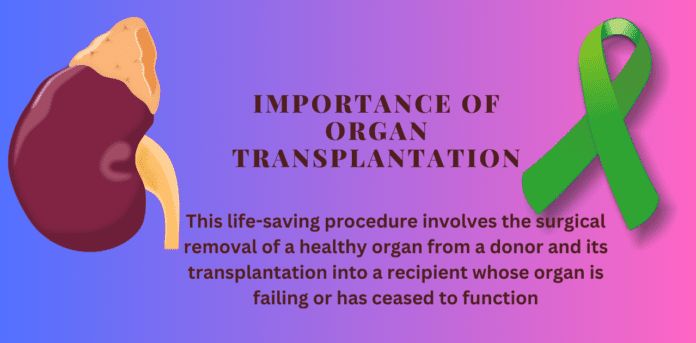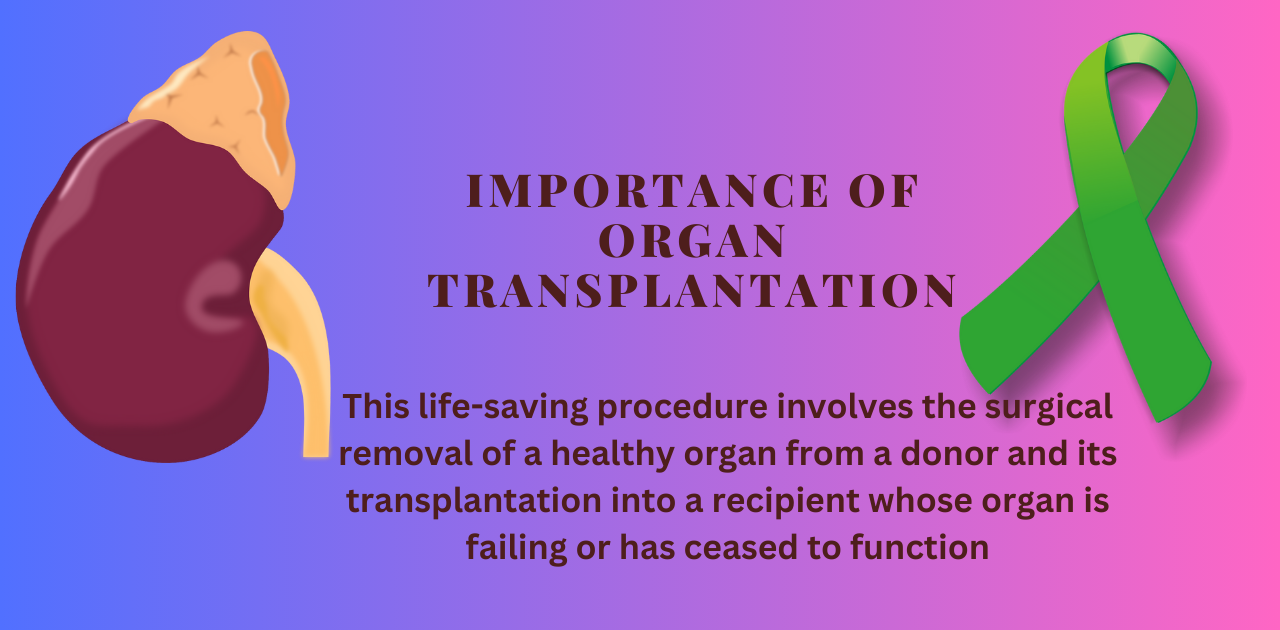Unlocking the Gift of Life: The Importance of Organ Transplantation
Organ transplantation stands as a beacon of hope for countless individuals facing life-threatening medical conditions. Through the selfless act of organ donation, lives are transformed, and futures are rewritten. In this article, we delve into the significance of organ transplantation, addressing its impact, challenges, and the imperative need for increased awareness and support.
1. Introduction
Organ transplantation involves the surgical removal of a healthy organ or tissue from one person (the donor) and its transplantation into another (the recipient) to replace a damaged or failing organ. This life-saving procedure offers a second chance at life for individuals suffering from end-stage organ failure, providing them with renewed hope and vitality.
2. The Gift of Life
Saving lives through organ donation
Organ transplantation represents the ultimate gift of life. For recipients, it means the difference between life and death, offering the opportunity to resume normal activities and spend precious moments with loved ones. Each donated organ has the potential to save multiple lives, amplifying the impact of a single act of generosity.
Impact on recipients and their families
The ripple effects of organ transplantation extend far beyond the recipient. Families are reunited, communities are strengthened, and society as a whole benefits from the restored health and productivity of transplant recipients. The gift of life transcends boundaries, uniting people in a shared mission of compassion and healing.
3. Addressing Organ Shortages
Challenges in organ transplantation
Despite the remarkable advancements in medical science, organ shortages remain a pressing concern. The disparity between the demand for organs and their availability poses significant challenges for transplant candidates, leading to prolonged waiting times and, in some cases, preventable deaths.
Strategies to increase organ donation rates
Efforts to address organ shortages encompass a multifaceted approach, including public education campaigns, legislative reforms, and initiatives to streamline the organ donation process. By raising awareness about the importance of organ donation and dispelling common misconceptions, we can encourage more individuals to register as donors and make a difference in the lives of others.
4. Medical Advancements and Innovations
Improving transplant procedures
Advancements in surgical techniques, immunosuppressive therapies, and organ preservation methods have revolutionized the field of organ transplantation. From minimally invasive procedures to personalized treatment regimens, medical professionals are continually striving to enhance patient outcomes and minimize the risk of complications.
Emerging technologies in organ preservation
Innovations such as machine perfusion and organ bio engineering hold promise for expanding the donor pool and improving transplant success rates. These cutting-edge technologies enable better preservation of organs during transportation and facilitate transplantation of previously unsuitable organs, thereby maximizing the number of viable donor organs available for transplantation.
5. Ethical Considerations
Allocation of organs
The equitable distribution of donor organs is a complex ethical issue that requires careful consideration of factors such as medical urgency, recipient suitability, and transplant waiting times. Ethical frameworks and allocation algorithms aim to ensure fairness and transparency in the allocation process, balancing the needs of individual patients with the broader societal good.
Consent and ethical dilemmas
Obtaining informed consent from both donors and recipients is paramount to upholding ethical standards in organ transplantation. Ethical dilemmas may arise in cases where donors are unable to provide consent or when conflicts of interest arise among transplant candidates. It is essential to uphold the principles of autonomy, beneficence, and justice throughout the transplant journey.
6. Spreading Awareness
Importance of education and advocacy
Public education plays a vital role in dispelling myths and misconceptions surrounding organ donation and transplantation. By engaging in outreach efforts and fostering open dialogue, we can empower individuals to make informed decisions about donation and support the transplant community.
Encouraging organ donation
Cultural norms, religious values, and personal experiences all play a significant role in the decision to donate an organ. By encouraging open conversations about donation, addressing concerns, and highlighting the life-saving impact of organ transplantation, we can inspire more people to register as donors and give the gift of life.
7. Conclusion
Organ transplantation represents the epitome of human compassion and scientific achievement. By unlocking the gift of life through organ donation, we not only save lives but also reaffirm the inherent value of every individual. As we strive to address organ shortages, advance medical technologies, and navigate ethical considerations, let us remain steadfast in our commitment to promoting organ donation and ensuring access to life-saving treatments for all.
Unique FAQs of organ transplantation
Can anyone become an organ donor?
Most individuals can become organ donors, regardless of age or medical history. It is essential to register as a donor and discuss your wishes with your family members.
How long do transplant recipients have to wait for an organ?
Waiting times for organ transplantation vary depending on factors such as blood type, organ availability, and medical urgency. Some patients may wait weeks or months, while others may wait years for a suitable match.
Are there any risks associated with organ transplantation?
Like any surgical procedure, organ transplantation carries risks, including infection, rejection, and complications from immunosuppressive medications.
Can organs be donated after death?
Yes, organs can be donated after death through deceased organ donation programs. It is crucial to express your wishes regarding organ donation. And discuss them with your family members to ensure they are honored.
How can I support organ transplantation efforts in my community?
You can support organ transplantation efforts by registering as an organ donor, participating in awareness campaigns, volunteering with transplant organizations, and advocating for policies that promote organ donation and transplantation.
What is organ transplantation?
Organ transplantation is a surgical procedure. In which a healthy organ or tissue is removed from a living or deceased donor and implanted into a recipient whose organ is failing or no longer functioning properly.
Which organs can be transplanted?
The most commonly transplanted organs include the heart, liver, kidney, lung, and pancreas, It is also possible to transplant tissues, including skin, bones, and corneas.
Who can be an organ donor?
Living donors can typically donate a kidney, part of their liver, or a lung. Deceased donors can provide multiple organs and tissues, but eligibility depends on factors like age, medical history, and cause of death.
How does the organ matching process work?
Organ matching involves a complex system that considers factors like blood type, tissue compatibility, recipient urgency, and waiting time. The goal is to find the best match to minimize the risk of rejection.
What are the risks and complications associated with organ transplantation?
Risks include rejection, infection, side effects of immunosuppressant drugs, and surgical complications. Long-term risks may also involve chronic health issues.
How long is the recovery period after a transplant?
Recovery times vary depending on the type of transplant and individual factors. Generally, recipients can expect several weeks to months of recovery, with ongoing medical follow-ups.
Can a person live a normal life after an organ transplant?
Many transplant recipients can lead fulfilling lives post-transplant. However, they may need to make lifestyle adjustments, take medications, and have regular medical check-ups.
Are there age restrictions for organ transplantation?
Age alone is not a strict criterion. Taking into account functional organs and general health.





